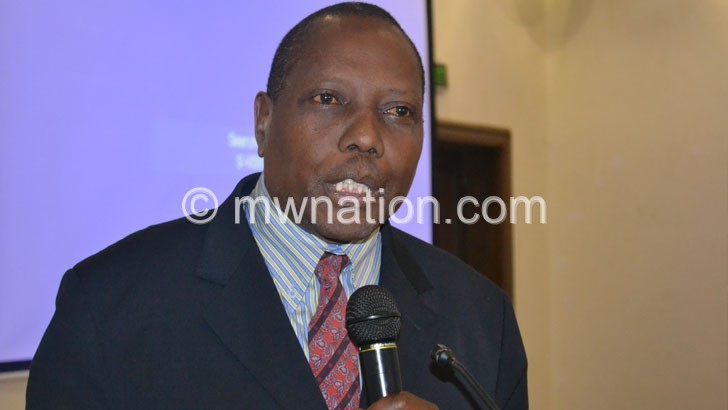Juggling act in house meet
With just a week before Parliament reconvenes in Lilongwe for the mid-term budget review, economic commentators have predicted a tough assignment for government to juggle between its economic priorities following calls from the International Monetary Fund (IMF) to trim the K900 billion ($1.3 billion) national budget for the 2015/16 financial year.
Parliament meets at a time the country is facing a critical shortage of maize, drug stockouts in public hospitals and a runaway inflation at 24.9 percent which has left the Malawi kwacha trading at about K750 to a dollar.

IMF said in December last year, Malawi was still in a tight situation to revive the off-track Extended Credit Facility (ECF) programme with the fund.
The body’s country representative in Malawi, Geoffrey Oestreicher, said expenditure cuts to complete the programme set for end-December 2015 would be central to bringing back stalled ECF on course.
He admitted that cutting some budget lines as the body proposed would be painful, but this would be less painful than to allow the current situation of high inflation rate which would lead to a reduced economic growth to continue.
Oestreicher said fiscal contraction by government was key to bringing down the rate of inflation in the economy which, he said, would bring down interest rates and spur economic activity, moving forward.
In December, the global multilateral lender also encouraged authorities to implement structural reforms to remove supply bottlenecks, increase agricultural productivity and improve the business environment.
Treasury spokesperson Nations Msowoya confirmed in an interview the Ministry of Finance is in the process of shuffling things around in readiness for the mid-term review by Parliament.

He highlighted that some government activities will be scaled down while others might be halted altogether in a bid to control spending.
“Yes, budget is being reviewed in order to align revenues with priority spending. However, at this stage, we cannot disclose which ministries and departments will be affected. As a criteria, we will seek to postpone those activities where little progress has been made so far and it is highly unlikely to register in the remaining months of the 2015/16 Financial Year. But we will ensure that essential services are preserved,” he said.
‘‘We are attending to it (Budget) now, but as protocol demands, we cannot disclose the details at this stage before Parliament sees them,’’ he said.
Chancellor College economics professor Ben Kaluwa said Parliament should exercise its mandate to scrutinise the budget and make the necessary amendments and not spare the budget for the State Residences which commentators have said is ‘untouchable’.
“There is need to make radical changes to the budget because it is laden with lots of pressures. On shorter term, spending cuts must be made to all the areas that are non-essential.

‘‘But in the longer term, government must be decisive by cutting the wage bill by, among others, trimming its workforce. They can do that by first not replacing those that retire. Government must also stand up and bring tougher contractual terms for its workers. There are a lot of people in the civil service who are doing nothing. Government fleet management is another cause of concern. They must also revisit the endless government allowances some of which do not make sense,” he said.
Economics Association of Malawi (Ecama) president Henry Kachaje predicted that the inflationary trends may not end in a day.
“The assumptions of a dropping inflation, predicted at 16.4 percent in 2015 and much lower in 2016 were made on the premise that the country would have a good harvest and that there would be a resumption of direct budgetary support. Unfortunately, both have not happened and might not happen in 2016. We should, therefore, expect inflation to remain high, probably above 22 percent in the first half of 2016. Should the crop estimates for 2016 be lower or similar to those of 2015, then it is unlikely for inflation to drop below 15 percent for the second half of 2016,” he said.
Kachaje said the country’s economic challenges have been exacerbated by the contraction in economic activities, especially in the manufacturing sector resulting in the Malawi Revenue Authority not being able to meet its targets.
He said the biggest area of government expenditure is the wage bill for the civil service and the associated emoluments.
Kachaje said: “This is perhaps the area that government has to seriously consider making some cuts on. For Malawi, I still believe there is a lot of wastage of resources as it was estimated that about 30 percent of our government revenue cannot be properly accounted for.
‘‘We have a painful decision to make; live with a cancerous leg and risk the cancer spreading to the rest of the body (the economy) or amputate it to save the life of the patient (in this case, the whole national economy).
In its mid-year budget review entitled ‘2015 MEJN Economic Reflections and Way-forward’, the Malawi Economic Justice Network (MEJN), among other things, raised concerns at trends of public over-expenditure and investment into the Descent and Affordable Housing Subsidy Programme (DHASP) which has targeted to construct 15 440 houses in its first phase.
The Mejn review harrowed on cases of government over-expenditure in some sectors at the same stage during the 2014/1015 Financial Year.
“It had been noted that some ministries and departments had overspent in the 2014/15 fiscal year. Examples had included the Malawi Defence Force, that had spent 63 percent of its annual vote by 31st December, 2014; the National Assembly (63 percent); the Accountant General’s Department (60 percent); Malawi Police Service (156 percent); the Malawi Electoral Commission (99 per cent), and the Department of Immigration that had spent 62 percent of its annual budgetary allocation half-way through the year,” reads the document in part.
The country’s economy is passing through turbulence with food shortage taking its toll as government struggles to stock Admarc markets with enough maize supplies.
There have been long queues in most Admarc markets across the country where quotas have gone down to as low as 10 kilogrammes per person with President Peter Mutharika in a statement publicly blaming vendors, for creating an artificial scarcity of the commodity.
Coincidentally, the country is reeling under unfavourable climatic conditions attributed to the El Nino phenomenon which has caused dry spells in many areas across the country threatening to cause more hunger next year.
Last week, the Malawi Law Society (MLS) threatened to take legal action on government if the State does not ensure that the country’s public health facilities are adequately supplied with essential medical drugs.
Leader of the House Francis Kasaila on Thursday told the Weekend Nation in a telephone interview that apart from the mid-term budget review, parliamentarians have a lot of business to transact.
“We anticipate that the House will deal with a backlog of outstanding bills, but we also intend to bring fresh bills. But at this point and time I might not be able to reveal what these bills are until the Business Committee meets on Wednesday next week to set the agenda,” he said.
Parliament is expected also to deliberate on the Access to Information (ATI) Bill which is one of the pre-conditions for the return for direct budgetary support by the country’s donors.





